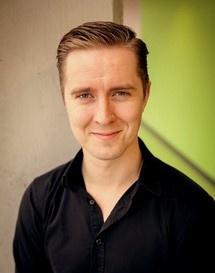May 2, 2018
Daniel Kopala-Sibley

Daniel Kopala-Sibley, PhD, is a new assistant professor in the Department of Psychiatry. He is also a member of the Mathison Centre for Mental Health Research & Education at the Hotchkiss Brain Institute in the Cumming School of Medicine. Daniel is also a member of the Alberta Children’s Hospital Research Institute. His research focuses on the influence of developmental experiences (parenting in particular, but also peers and life stress in general) over time on changes in personality and brain functioning in youth, and how these factors interact to influence risk for depressive and anxiety disorders.
Daniel moved to Calgary in fall 2017 and is setting up his lab which will examine predictors of the onset of first-episode depressive and anxiety disorders in early adolescents who have at least one parent with a history of these illnesses, and who are therefore at high risk.
Daniel shares his early impressions of the Cumming School of Medicine and his experience settling in Calgary.
Tell us a bit about your childhood and family, and how that has influenced you.
My parents are pretty fantastic and have always encouraged me to pursue whatever I enjoy in life. They were always quite supportive and compassionate and there for me when something was wrong. I think their care and support along the way are one of the reasons I’ve wanted to better understand how parenting influences child development.
I grew up with a lot of philosophy and debate. Dinner time conversation was rarely about how our day was, we usually ended up debating some political, social, or moral issue. I was really raised to be a bit of a devil’s advocate or contrarian. If I stated an opinion or idea I usually had to be able to defend it. While it, at times, drove me nuts as a teen, it definitely influenced how I think and approach academic and research issues.
What led you to your career in academia?
In my teens I became curious about why people reacted so differently to the same stressful things –for example, why does one person brush it off when they do badly on a test but another person becomes extremely anxious or sad. I became curious about what made people vulnerable to depression and anxiety. When I started my undergraduate degree, I found out this was in fact a huge area of research, which I’ve been pursuing ever since. More broadly, I’ve always been interested in understanding why people are the way they are. Academic research into how people develop and how they’re influenced by what happens to them in life is how I’ve decided to go about looking at this question.
Were there any other career interests you have explored in the past?
I think I recall Batman or being a professional baseball player as viable career options when I was a kid. Otherwise, I’ve been pretty fortunate to be fairly certain about going into academic and clinical psychology since at least my undergraduate degree. I also loved philosophy in undergrad, and often thought about pursuing that at the time, but decided I was more interested in empirical approaches to studying the mind.
Can you tell us a bit about your previous institution and your work there?
I came here after completing three years of a post-doctoral fellowship at Stony Brook University in Stony Brook, Long Island, New York. I worked with Dr. Daniel Klein and was extremely fortunate to be involved in a 12-year longitudinal study of children and their families that looked at risk for mental illness in children. I particularly focused on factors that influence the development of children’s temperament over time and how temperament influences risk for depressive and anxiety disorders. It was an incredible opportunity to work with a rich, multi-level, carefully designed longitudinal dataset.
What are your early impressions of the University of Calgary and the city of Calgary?
So far I’m really enjoying living in Calgary. There are plenty of fantastic restaurants, the nature and scenery are beautiful, and there’s a lively arts and culture scene here. I’ve also had a great experience starting up my work at Calgary. I feel as though there’s a strong drive to excel here, and when the university says they aim to be a Top 5 university in the country, I can tell they really are doing what’s necessary to accomplish that. I’ve felt very supported in getting settled in and getting my work up and going. Everyone has been very warm, welcoming, and available to help whenever I need it, which I greatly appreciate as a new professor.
Do you have any advice for students pursuing careers along the same trajectory as you?
Yes, although a whole book(s) could easily be written about that topic. First, and I think most importantly, find an amazing supervisor.
Second, find a topic you’re intrinsically motivated to study, but that finds a balance between what you want to study and what other people are going to find interesting.
Third, realize that it’s going to be a long and often hard road. It’s a path that is ultimately very fulfilling and has many incredible perks (I honestly think being a professor is the best job in the world), but also one where you’ll be dealing with rejection and scrutiny on a regular basis.

Daniel Kopala-Sibley


